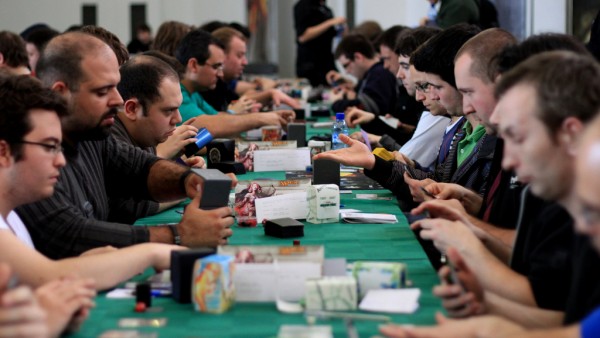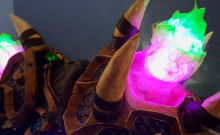I didn’t have many friends growing up. I still don’t. My free time was spent with my nose in books. Fantasy, science fiction, adventure. I became a dragon rider, a Harper, a Galadhrim, a powerful mage, a Lioness Rampant. I fought Buggers and became a Jedi and ventured to places that no man—or woman— had gone before.
Then I entered the school system. As a girl my interests were ridiculed. Being a nerd was derogatory, being a loner was worse. I tried to fit in—which never works out well. My early teenage years were dark and I fell into a pit of depression.
From that I rediscovered my love of fantasy. Started reading again, started watching TV shows, movies, and gaming.
It all began one day during one of those annoying end of the year tests my freshman year of high school. We all finished early and because of some stupid rule we had to stay until all the other classrooms were done. BORING. Then two kids I sort-of knew pulled out decks of cards and started to play. Not your traditional playing cards, these were brightly colored and depicted a fantasy battle between good and evil. Curious, I asked to play and was immediately hooked. Little did I know this fantasy card game—Magic: the Gathering—would grow to consume the next four years of my life (and a large chunk of my savings).
In the game the players are powerful mages known as Planeswalkers who can walk the æther between worlds and wield strong magic representing the five colours of magic—white, blue, black, red and green.
| WHITE | BLUE | BLACK | RED | GREEN |
| Order | Knowledge | Darkness | Freedom | Growth |
| Protection | Manipulation | Ambition | Emotion | Instinct |
| Light | Illusion | Death | Impulse | Nature |
The actual game consists of decks of 60 cards that have cards of one or more colour and lands representing those colours. Lands, which can be played once a turn, are sources of mana—the magical energy that allows you to cast spells.
With this magical energy you can summon creatures and cast powerful spells to aid you in your endeavor to destroy your enemies—i.e. the opposing player. Cards can be played by paying the cost in the upper right corner of the card. For example, Squelching Leeches costs two black mana (from swamps) and two mana of any other colour.
Creatures have a power and toughness in the bottom right corner that shows how much attack and defense they have. Creatures can attack the opposing player and the point of the game is to get your opponent from 20 life points to 0. Obviously it gets a whole lot more complex than that as the game is twenty years old and there are over 14,000 different cards in existence to build decks with and play with your friends.
The summer before my sophomore year of high school I was at a Fred Meyers and convinced my dad to get intro packs of Magic so we could play together. He was a protector of the wild with his white and green deck, and I wielded black and red vampires—hey, it was the Twilight era and I was 15, vampires were hard to avoid. I learned the game properly that summer and come the fall I started playing with a group of friends at my school. It was obsessive. We played before school, at lunch, afterwards during tutorial. I thought about magic. I read about magic. I spent my free time designing weird dragon decks and mind controlling decks to beat my friends with. (I spent my money on the game too).
New sets came out quarterly, and with them hundreds of new cards and special release events at your local card/comic/game shop. These events brought the Magic community together, and at Uncle’s Games—my card shop—I finally found my calling. I started going to weekly events called drafts where you and a bunch of other people make decks from scratch by passing around card packs and building decks to fight each other with.
I was terrible. But who isn’t in the beginning, honestly?
Eventually I was taken under the wings of two Andrews (Weiss and Wagner) who taught me how to play better (and faster—Wagner was always on me to play faster). They taught me strategies and tactics and intuition. Little tricks to keep track of life totals, ways to protect my cards. Lines of play that would allow me to beat my opponents. I met lots of interesting other people from all sorts of walks of life.
There were many long evenings spent siting at tables in a labyrinth of board games engaged in a battle of luck and skill. I got competitive, I started winning. The game was my life and most of my friends played. It was a focus.
It changed the way I think. Magic isn’t just a game to me, it’s critical thinking, meta-gaming, combat math, and statistics. It’s a game where you constantly have to think on your feet.
It’s a game of life lessons.
The secondary card market is a mini-economy where card values are like stocks. Prices for some cards are as little as a few cents, while other rarer cards can be hundreds of dollars. Some don’t even play the game, but just speculate on 3”x5” pieces of cardboard. (I never said the system was perfect, some do call the game “cardboard crack” for good reason).
My entrance to the competitive tournament scene in 2012 was a big shift in my life and ignited my passion for gaming of all sorts in the years to come. I played a weird deck of my own invention to a 6-3 finish, netting me 84th place out of ~250 people, which was somehow better than the rest of my group. (You can read my tournament report here if you’re interested: http://tinyurl.com/nu8lp87 ).Their admiration and praise was a big boost to my self-confidence, and made me want to become an even better player.
So I did (well, I tried anyways).
There was a span of a few months where I was ranked in the top 100 people in Washington state playing the game, pretty meaningless overall, but for someone who has rarely ever been happy with themselves, it meant that I was achieving something.
I dabbled in designing cards for fake fan sets, but was never good at balancing the power level. I also used the game to reignite my passion for art. Friends asked me to paint boxes for dice to look like their favorite cards, I drew on playmats, and extended the art on the actual cards. Eventually I started cosplaying my favorite characters from the game.
Through the game I met some of the nicest, funniest people I know. We formed a group to play together and test for tournaments, and called ourselves the Boldwyr Intimidators after a card from the game which declared that “Cowards can’t block Warriors”. We were warriors—well, twenty or so very nerdy human warriors. Through them I moved on to play Magic at a different level. Before I had played only with the cards from the last two years in tournaments—called standard— but the rest of the group was getting into, or already played a format called Legacy that comprised all the cards in Magic’s history with a few overly powerful and expensive exceptions. That’s not to say it wasn’t expensive because it was. Good decks played some of the best cards in the game, and I sold every deck I owned to buy into that format. But playing it was some of the most fun I had ever had. It was complex, with many interactions and viable strategies. Unlike Standard, which had few viable decks, there were decks for any strategy you wanted to play in Legacy, and they were all good.
To win at this level of play you had to really know what you were doing as many interactions and combinations involved correct timing and knowledge of the opponent’s strategies and the plays that you know they can make with their specific deck. It’s a very intensive format and involves lots of critical thinking, but in my opinion is the best way to play the game.
The skills I’ve picked up playing Magic are skills that I can use both in everyday life and in other games. I know how to judge a skill, I know how to play to my advantage, I know how to read body language. But I know that I’m nowhere near to being the best player out there. I don’t expect to win, I don’t feel entitled to it, I just know that I’ll learn from my losses and grow as a player and lover of games.
To me the best part of games like Magic, is the people I meet and the experiences I have. And that’s what makes it such a magical game.
I don’t play a whole lot any more, even before college started, we all started to drift and many stopped playing. Some had jobs, some had school, others found new games to occupy themselves with (/cough Hearthstone /cough), but we’re still a team.
And they’re still my friends.











Leave a Comment